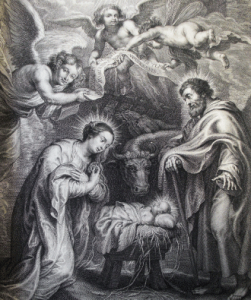 Typology is relevant for understanding many Old Testament quotations and allusions that we find in the New Testament. In a recent post, we looked at an example of typology from Matthew’s Gospel. Here is another one.
Typology is relevant for understanding many Old Testament quotations and allusions that we find in the New Testament. In a recent post, we looked at an example of typology from Matthew’s Gospel. Here is another one.
Example 2:
“And she will bear a son, and you will call his name Jesus, for he will save his people from their sins. And all this happened so that what was spoken by the Lord through the prophet might be fulfilled, ‘Behold the virgin will conceive and give birth to a son, and they will call his name Immanuel,’ which is translated, ‘God with us’” (Matthew 1:21-23 with quote from Isaiah 7:14).
The use of Isaiah 7:14 in Matthew 1:21-23 is probably another example of typology, although some interpreters would regard Matthew’s use of Isaiah 7:14 as direct prophecy. Why is it probably an instance of typology?
What is happening in Isaiah 7-8?
Ahaz, the king of Judah, finds himself being attacked by Rezin, the king of Aram, and Pekah, the king of Israel (Isa. 7:1-9). In light of this threat, God sends Isaiah to Ahaz to give him a sign. Ahaz refuses to request a sign, so God gives him one in Isaiah 7:14-16. A virgin will bear a child and call his name Immanuel. Before he is old enough “to refuse evil and choose good,” the lands of Ahaz’s two opponents will be forsaken (7:15-16). Then, in Isaiah 8:3, Isaiah’s wife, the prophetess, conceives and gives birth to a son. The Lord says to name him, “Swift is the booty, speedy is the prey” (see 8:1, 3 NASB), because the boy will not be old enough to say “my father” or “my mother,” before Damascus (Rezin’s capital city) and Samaria (Pekah’s capital city) are conquered by the king of Assyria.
Therefore, when one reads Isaiah 8:1-4 alongside of Isaiah 7:1-16, it appears that Isaiah’s son in the sign that God promises in Isaiah 7:14. Isaiah’s son is a sign of salvation for King Ahaz and Judah from their enemies, Rezin (Aram) and Pekah (Israel). These two kings will not manage to conquer Judah and set up a king there to replace Ahaz (Isa. 7:6). Instead, Assyria will conquer both of these nations before that can happen.
How does this relate to Matthew 1:21-23?
In Matthew 1:21, Joseph is supposed to name Mary’s son Jesus, “for he will save his people from their sins.” The name Jesus has to do with salvation. Note the new context. God’s people are in need of salvation, but it is salvation from their sins that they need rather than salvation from their human enemies. The child of the virgin will be the new “Immanuel.” God is with his people to save them.
Reading the Old Testament already prepares us for the need for salvation from sin. One finds plenty of evidence in the Old Testament that it was the sins of God’s people that were the real source of their problems. God repeatedly shows that he can deliver his people from their human enemies. He tells them that he can and will deliver them from their enemies, if they are his faithful and obedient people. If they decide to forsake him and follow in the paths of sin, then they will eventually fall to their enemies. This is what happens to both Israel and Judah.
One can now see why the use of Isaiah 7:14 in Matthew 1:21-23 is probably an instance of typology. The promised child of Isaiah 7:14 is born in 8:1-4. He is a sign of salvation from their human enemies. This provides the type or pattern for the birth of another child, Jesus, who will be the sign of a greater salvation. Through Jesus will come salvation from a more fundamental and devastating enemy, sin itself. How will Jesus save them from their sins? His blood will be poured out “for the forgiveness of sins” (Matt. 26:28).
Related Resources:
 Paul Hoskins, That Scripture Might be Fulfilled: Typology and the Death of Christ Paul Hoskins, That Scripture Might be Fulfilled: Typology and the Death of Christ |
 D.A. Carson: Matthew, The Expositor’s Bible Commentary D.A. Carson: Matthew, The Expositor’s Bible Commentary |